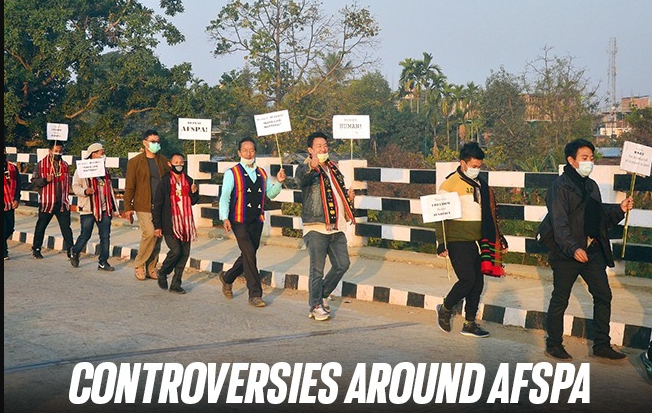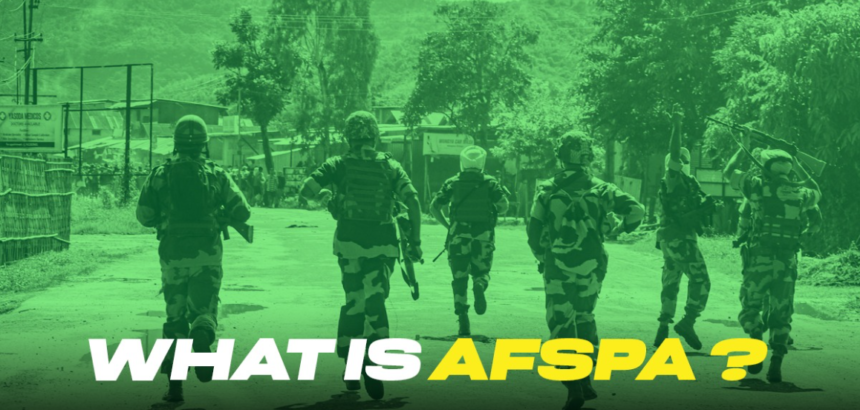AFSPA : In places deemed to be “disturbed areas,” the Indian Armed Forces, state forces, and paramilitary forces are given exceptional authority under the Armed Forces exceptional Powers Act , a parliamentary statute. The immunity from punishment for military activities has generated a great deal of debate since it can result in unregulated decision-making.
Except for areas governed by 19 police stations, including the state’s capital Imphal, the Manipur government on Wednesday designated the whole state a “disturbed area” under the Armed Forces Special Powers Act (AFSPA) for a term of six months.
This choice was made in response to the current law-and-order crisis, which was brought on by the murder of two students from the Metei community, which incited fierce riots in Imphal. Notably, the Central government has also prolonged AFSPA for an extra six months in Arunachal Pradesh and Nagaland.
What Is AFSPA?
In places deemed to be “disturbed areas,” the Indian Armed Forces, state forces, and paramilitary forces are given exceptional authority under the Armed Forces exceptional Powers Act (AFSPA), a parliamentary statute. To uphold law and order in these places is the major goal of the AFSPA. When dealing with insurgencies or militancy, it gives these troops the authority to deploy strict tactics including shoot-to-kill, house searches, and property destruction.
Key AFSPA Provisions
- In order to combat terrorist activities or threats to India’s sovereignty, national flag, anthem, or Constitution, the Governor of a State and the Central Government may proclaim any area, or the entire state, as a “disturbed area.”
2. When a territory is formally deemed “disturbed,” Section (3) of the AFSPA permits the Central government to send in the armed forces to support the civilian authority. The Gazette of India must publish this declaration.
3. According to The Disturbed Areas Act of 1976, the designation of a “disturbed area” must be upheld for a minimum of three months.
4. Army personnel are given extraordinary authority under Section (4) to use force, including lethal force, against those they believe of breaking the law in unrest regions. It must be announced before firing. This includes scenarios where five or more people are gathered together and weapons are carried.
5. Security forces have the right to make arrests without a warrant and perform searches without a warrant’s approval.
6. Those who have been detained must be delivered as soon as feasible to the closest police station.
7.The Central Government must first provide its consent before prosecuting on-duty officials for alleged human rights abuses.
Background History of AFSPA
The Armed Forces Special Powers Ordinance, passed by the British colonial government during the Quit India movement, is where AFSPA got its start. It was first used in Assam in 1947 to address problems with internal security brought on by Partition.
To address uprisings in the Naga Hills and surrounding regions, the Armed Forces (Assam and Manipur) Special Powers Act, 1958, was passed. In 1990, AFSPA took the place of the Act to allow for broader implementation, including in Jammu and Kashmir.
“Disturbed Areas” are declared under the AFSPA

Under Section 3 of the AFSPA, a “disturbed area” is formally proclaimed through notification. Such regions may be the outcome of conflicts between various racial, ethnic, linguistic, or geographical groupings. The Central Government, the Governor of the State, or the administrator of the Union Territory has the authority to designate a region disturbed and may publish notices in the Official Gazette.
The AFSPA is typically enforced by the Ministry of Home Affairs, although there are few cases when State governments are given the last say.
States Under AFSPA
At various points, a number of Indian states have been subject to the AFSPA, including Jammu and Kashmir, Assam, Manipur, Nagaland, Meghalaya, and Arunachal Pradesh.
AFSPA is surrounded by controversy.
Although the AFSPA is thought to be a vital instrument in the fight against militancy and insurgency, it has come under heavy fire and controversy.

ALSO READ : Why Is Karnataka Withholding Water From Tamil Nadu? What Is The Cauvery Water Dispute?
Violates Human Rights : Critics claim that the AFSPA violates human rights, citing examples of suspected murder and rape in detention as evidence.
Misuse of Absolute Power : The statute gives the military complete authority, allowing them to shoot people on sight if they are suspected of being a threat, potentially breaching their right to life.
Violates Fundamental Rights : Fundamental rights are violated because the AFSPA’s arbitrary detention and arrest powers run counter to Article 22, which protects against preventive and punitive detentions.
Immunity from Punitive Action : The Armed services Special Protection Act (AFSPA) provides immunity to the armed services, making it harder to hold them responsible for their conduct and raising worries about potential power abuse.
It is believed that the fundamental right to life is violated by the armed forces’ total power, which includes their ability to shoot someone on sight based on mere suspicion. The immunity from punishment for military activities has generated a great deal of debate since it can result in unregulated decision-making.




































